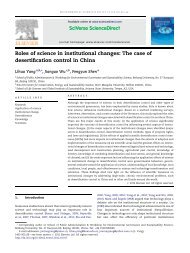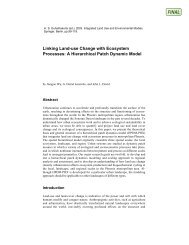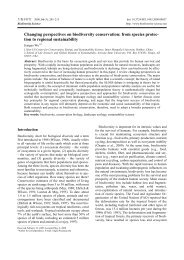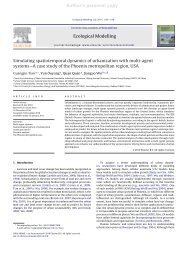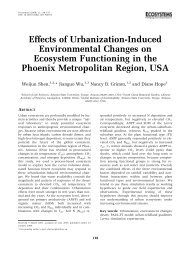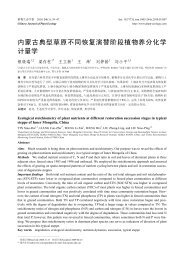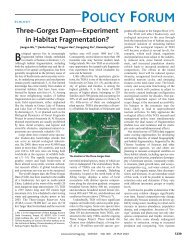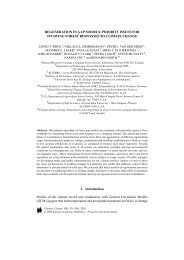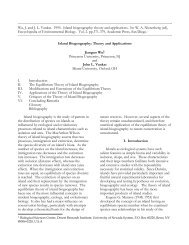Landscape ecology - Arizona State University
Landscape ecology - Arizona State University
Landscape ecology - Arizona State University
You also want an ePaper? Increase the reach of your titles
YUMPU automatically turns print PDFs into web optimized ePapers that Google loves.
Comp. by: THAMIZHVEL V Stage: Galleys Chapter No.: 575 Title Name: ESST<br />
Page Number: 0 Date:7/12/11 Time:00:19:35<br />
12 L<br />
t2:1<br />
t2:2<br />
t2:3<br />
t2:4<br />
t2:5<br />
t2:6<br />
t2:7<br />
t2:8<br />
t2:9<br />
t2:10<br />
t2:11<br />
t2:12<br />
t2:13<br />
t2:14<br />
<strong>Landscape</strong><br />
<strong>Landscape</strong> Ecology. Table 2 A list of major research topics in landscape <strong>ecology</strong> suggested by a group of leading<br />
landscape ecologists from around the world at the 16th Annual Symposium of the US Regional Association of the<br />
International Association for <strong>Landscape</strong> Ecology, held at <strong>Arizona</strong> <strong>State</strong> <strong>University</strong>, Tempe, in April 2001 [2]<br />
Development of theory and<br />
principles<br />
● <strong>Landscape</strong> mosaics and ecological flows<br />
● Land transformations<br />
● <strong>Landscape</strong> sustainability<br />
● <strong>Landscape</strong> complexity<br />
<strong>Landscape</strong> metrics ● Norms or standards for metric selection, change detection, etc.<br />
● Integration of metrics with holistic landscape properties<br />
● Relating metrics to ecological processes<br />
● Sensitivity to scale change<br />
Ecological flows in landscape<br />
mosaics<br />
● Flows of organisms, material, energy, and information<br />
● Effects of connectivity, edges, and boundaries<br />
● Spread of invading species<br />
● Spatial heterogeneity and ecosystem processes<br />
● Disturbances and patch dynamics<br />
Optimization of landscape pattern ● Optimization of land use pattern<br />
● Optimal management<br />
● Optimal design and planning<br />
● New methods spatial optimization<br />
Metapopulation theory ● Integration of the view of landscape mosaics<br />
● Integration of economic theory of land use change and cellular automata<br />
Scaling ● Extrapolating information across heterogeneous landscapes<br />
● Development of scaling theory and methods<br />
● Derivation of empirical scaling relations for landscape pattern and processes<br />
Complexity and nonlinear<br />
dynamics of landscapes<br />
● <strong>Landscape</strong>s as spatially extended complex systems<br />
● <strong>Landscape</strong>s as complex adaptive systems<br />
● Thresholds, criticality, and phase transitions<br />
● Self-organization in landscape structure and dynamics<br />
Land use and land cover change ● Biophysical and socioeconomic drivers and mechanisms<br />
● Ecological consequences and feedbacks<br />
● Long-term landscape changes driven by economies and climate changes<br />
Spatial heterogeneity in aquatic<br />
systems<br />
● The relationship between spatial pattern and ecological processes in lakes,<br />
rivers, and oceans<br />
● Terrestrial and aquatic comparisons<br />
<strong>Landscape</strong>-scale experiments ● Experimental landscape systems<br />
● Field manipulative studies<br />
● Scale effects in experimental studies<br />
New methodological<br />
developments<br />
Data collection and accuracy<br />
assessment<br />
Fast changing and chaotic<br />
landscapes<br />
Ecology<br />
● Integration among observation, experimentation, and modeling<br />
● New statistical and modeling methods for spatially explicit studies<br />
● Interdisciplinary and transdisciplinary approaches<br />
● Multiple-scale landscape data<br />
● More emphasis on collecting data on organisms and processes<br />
● Data quality control<br />
● Metadata and accuracy assessment<br />
● Rapidly urbanizing landscapes<br />
● War zones<br />
● Other highly dynamic landscapes




